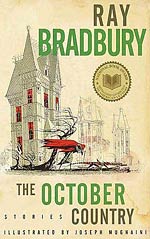
![]() BigEnk
BigEnk
2/5/2025
![]()
The October Country is a short story collection from Ray Bradbury's early writing days that have a centering around stories that are 'horrifying' or 'macabre' in a stereotypical 1940's fashion. Though through my own reading, the horrifying elements that are found in most of these tales are internal in nature. The terrifying ways in which our own mind can play tricks on us, warping our perception of ourselves, our immediate situation, or other people in our lives.
Mental health (or emotional fears/fixations) is the true terror that can strike any one of us at anytime, not the ghost in our closet or the vampire in our basement. Whether Bradbury was intentional in this effect is something that I can not say, but I have a hard time reading these stories believably with any other lens. Anxiety(The Next in Line), hypochondria(Skeleton), loneliness(The Emissary), post-partum depression(The Small Assassin), rubbernecking(The Crowd), PTSD(The Wind), body dismorphia(The Dwarf), or jealousy(The Jar). The list goes on. These stories read as horrifying as they do because of how relatable and real the struggles of the characters are. The collection is very ahead of it's time in this way, retaining a lot of its value despite its age.
Unfortunately, Bradbury feels the need to go beyond these internal and deeply human realities. Most of the stories here conclude with a twist ending, usually something that was telegraphed from the very beginning. This twist moves the conclusion towards something much more supernatural or fantastic. The old man up the stairs really was a vampire, it wasn't just the child's fear of the unknown. The little baby was actually the spawn of Lucifer, it wasn't just the mother dealing with an upending of their emotional and physical labor. Perhaps this is an emblem of the time that the stories were written. Bradbury needed a check and he knew what would sell. I still can't help but think that these cheesy endings brought each story down a bit. They feel completely superfluous, and have the added effect of making the stories too similar in structure to one another.
All that being said, I think The October Country is still Bradbury at his finest. He is a master of the short story form, crafting short and clear arcs that leave me feeling satisfied upon their conclusion. His prose style is excellent, crafting sentences of true elegance. He lucidly places you into the world that he creates, describing the senses in a way that is both believable and fantastical. In addition, the stories gathered for this collection are not only evenly high in quality but fit together well in creating broader themes. There are only a few stories that I can say were mild disappointments, which is more than I can say for most collections or anthologies. There's a part of me that wished I had waited to read The October Country until the autumn season, but having it shine so brightly now made me confident that it doesn't need external mood to prop itself up on.